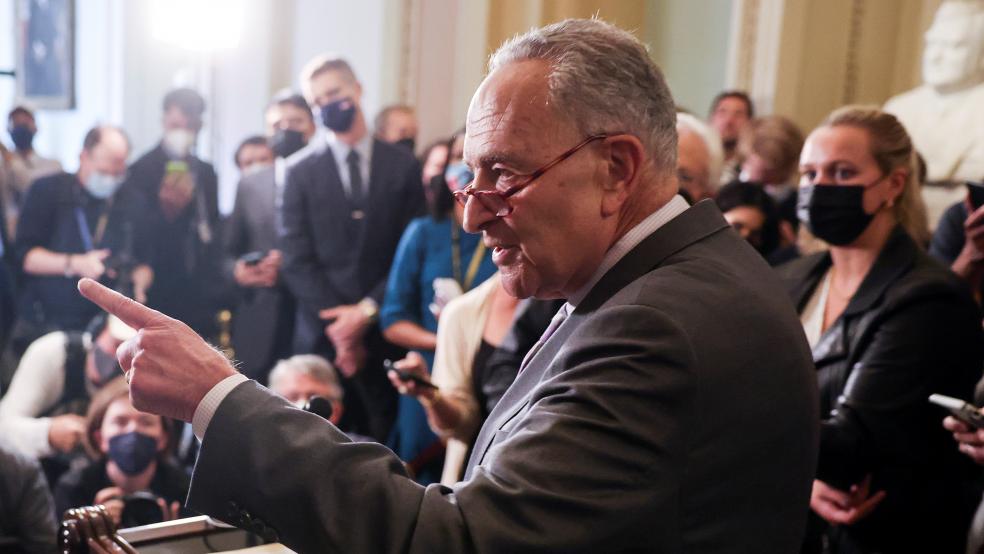Senate Democrats voted Thursday night to raise the nation’s debt limit by $480 billion, a short-term fix to postpone until December the threat of economic disaster that had been looming later this month, when the Treasury Department was set to exhaust the extraordinary measures it has been employing to keep paying the government’s bills.
The 50-48 party-line vote came after 11 Republicans joined with Democrats to overcome a GOP filibuster and allow the debt limit increase to advance, enabling Democrats to approve it with a simple majority. Securing those 11 GOP votes reportedly required a furious whipping effort by Republican leaders.
But the weeks-long political drama surrounding the debt ceiling increase didn’t end there. Because of course it didn’t.
Schumer sparks criticism: Democratic Majority Leader Chuck Schumer (NY) had teed up the final vote with a short speech from the Senate floor tearing into the GOP.
“Republicans played a dangerous and risky partisan game, and I am glad that their brinksmanship did not work. For the good of America’s families, for the good of our economy, Republicans must recognize in the future that they should approach fixing the debt limit in a bipartisan way,” he said. “I thank, very much thank, my Democratic colleagues for our showing our unity in solving this Republican-manufactured crisis. Despite immense opposition from Leader McConnell and members of his conference, our caucus held together and we have pulled our country back from the cliff’s edge that Republicans tried to push us over.”
Republicans complained about the partisan nature of Schumer’s remarks, as did Sen. Joe Manchin, the West Virginia Democrat. Seated behind Schumer during the speech, Manchin could be seen shaking his head and burying his face in his hands before walking away. Manchin reportedly told Schumer his speech was “f---ing stupid.” Manchin denied dropping an f-bomb but told reporters that he didn’t think the comments were appropriate. “We have to de-weaponize,” he said, adding, “Civility is gone and I’m not going to be part of getting rid of it. I’m going to try to bring it back and I speak out when I see someone do something I don’t like.”
What’s next: The House is set to take up the debt limit extension on Tuesday, and both parties will then resume their clashes over infrastructure and Democrats’ multitrillion-dollar social spending plans.
But the two sides will be revisiting their battles over the debt ceiling issue within weeks. Republicans still insist that Democrats must use the budget reconciliation process to enact a longer-term increase in the borrowing limit on their own. Democrats still insist that won’t happen.
The coming battles may be even more fraught since former president Donald Trump and his allies are accusing McConnell of folding to Democrats on the issue, which will likely make Republicans even more wary of being linked to an increase. The next debt limit deadline, December 3, may also be trickier to navigate because it coincides with a recently established deadline to again fund the government and avoid a shutdown.
“Late November and December are going to be rough,” Punchbowl News predicts. “It seems exceedingly unlikely that Republicans will help Democrats with lifting the debt limit again -- no matter what Schumer’s world says. Then we’ll really have a default crisis and a government shutdown showdown on our hands.”
It’s possible, though, that the next debt limit deadline will actually come in 2022. “An extra $480 billion on top of existing cash balances and extraordinary measures probably pushes the X date into February,” tweeted Donald Schneider, an economist at Cornerstone Macro and former chief economist for House Ways and Means Committee Republicans.
Either way, enjoy this brief intermission while it lasts.
The Debt
Senate Votes to Defuse Debt Crisis, but Not Without More Drama

Reuters/Evelyn Hockstein




